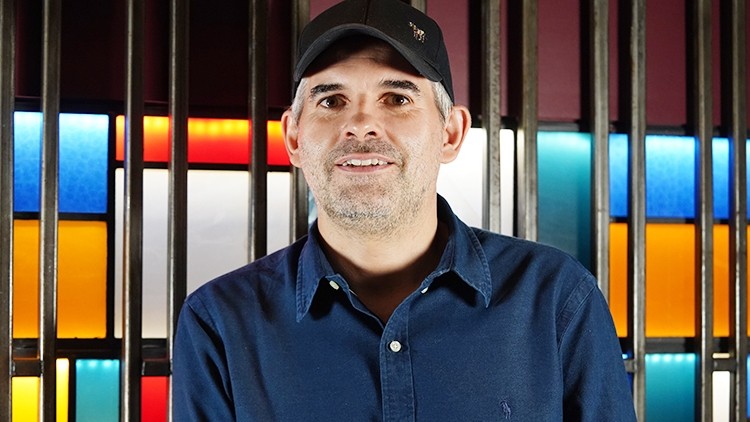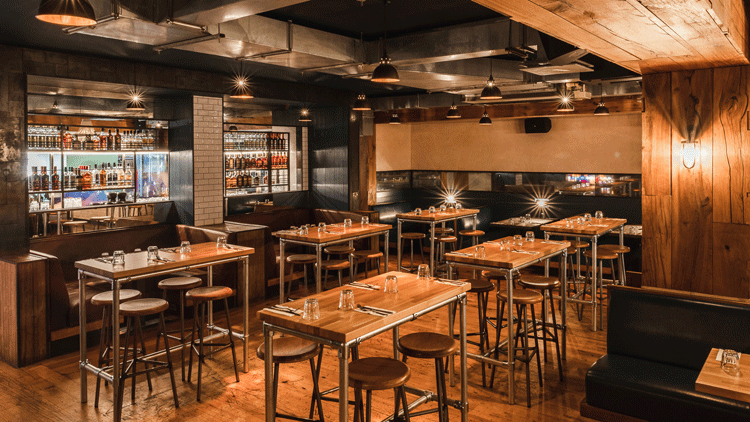Carnival spirit: how The Rum Kitchen made the best of Covid-19

The Rum Kitchen’s new Brighton restaurant used to be home to a Jamie’s Italian. Those familiar with the former occupant – which closed its doors in 2019 as Jamie Oliver’s UK restaurant business collapsed – may notice that many fixtures and fittings remain in place, with the glass-fronted cabinets that previously displayed the celebrity chef’s cookbooks now packed full of rum.
Other elements have been repurposed, for example the metal that once wrapped round the bar has been used to create a raised DJ booth. The layout of the site has also been retained, with the bar positioned in the middle of the space to break things up.
The total bill for the fit out was £250,000, a relative pittance for such a large restaurant (the site can handle a whopping 300 covers). “We didn’t even touch the loos,” says The Rum Kitchen managing director Mike Parnham. “Come to think of it, they are the fanciest toilets we’ve ever had.”
The now four-strong Caribbean-themed restaurant group got a decent deal on the site, too. “It helped that it had been vacant for over two years,” Parnham continues. “We must have looked at 50 sites before we found this one but there was always something that wasn’t quite right. We fell in love with this place straight away. Once it gets to maturity, we’re looking at up to £60,000 per week.”
A brand with bottle
Close to Brighton’s The Lanes area and moments from the seafront, the restaurant represents a big milestone for The Rum Kitchen as its first site outside the capital. The brand was launched in 2013 when Jonny Boud and Alex Potter took on the former The Mangrove site in Notting Hill. Heavily influenced by New York’s Miss Lily’s, the pair created a beach shack-themed rum bar and restaurant that soon spawned further sites in Brixton and Soho’s Kingly Court.
The pair are no longer operationally involved in the business flowing its sale to investment vehicle Naga Partners, which is steered by several sector big hitters including Karen Forrester and Keith Bird.
Parnham is an ideal candidate to lead The Rum Kitchen having spent 12 years at Las Iguanas (he left as operations manager). The Latin American-styled chain was one of the first brands to fuse casual dining with a boozy, high-energy environment and – in many ways – The Rum Kitchen is an evolution of that very blueprint.
“I still speak to [Las Iguana's founders] Eren (Ali) and Ajith (Jayawickrema). I learnt a lot from them as I joined them when they only had four restaurants. Eren was totally focused on the detail and structure of the business while Ajith was more of a showman with a good eye for the finishing touches and service.”
“They worked incredibly well together and put a huge amount of effort into getting the foundations right. They only opened a handful of sites in the first four years despite the early restaurants being a big success,” says Parnham, who left the business in 2015 as it was sold to Casual Dining Group (now The Big Table).
Parnham took the reins at The Rum Kitchen in 2019 and almost immediately closed the fledgling group’s original site. “It was more of a late bar and did not fit with the two other sites,” Parnham explains.
“The remaining two were quite different from each other. The brand had expanded quite fast, so my job was to take a step back, bring everything into line and reset all the standards. I followed the Las Iguanas model of putting great people around me, motivating them and allowing them to do great things.”
In good spirits
Despite the trials of the past 18 months or so, Parnham is in good spirits. “We’ve done really well when we have been allowed to open, we’ve typically traded 10%-15% above pre-Covid levels.” Save for a small project with Deliveroo that was designed to keep staff employed and test out some new dishes, The Rum Kitchen didn’t pivot during the pandemic.
With that in mind, how on earth did a late-night, party-orientated business put in such a strong performance? “With nightclubs and many bars unable to open, we were able to hoover up a lot of that business,” Parnham explains. “People still wanted to meet friends and have drinks. I guess we provided a bit of escapism from it all. Our DJs played throughout.”
The Rum Kitchen’s focus on bookings – around 90% of its weekend business comes from reservations – has been key to this and made the 10pm curfew much easier to deal with. “People book because The Rum Kitchen is a place they tend to have a whole night out in. They will often have a drink in the bar ahead of their meal, have dinner, and then go back to the bar for a nightcap. That was a big plus for us because moving between venues was not so easy.”
Average dwell time at Rum Kitchen is three hours, according to Parnham.
The rum diaries
The Rum Kitchen’s lengthy dwell time results in an average spend per head that’s much higher than a typical casual dining restaurant. “We’re at about £36 and a lot of that extra spend comes from alcohol, which is obviously more profitable and less labour intensive to serve than food,” says Parnham, who clocks the wet:dry split at the group at around 50:50. Each restaurant offers 100 different rums (Jamaica’s Appleton’s is the house pour) and is focused on classic rum cocktails, including daiquiris, mojitos, mai tais and rum punch.
As you’d expect, the food menu at The Rum Kitchen is Caribbean inspired. The key dishes are all obvious ones - jerk chicken, curried goat, plantain and rice and peas – but the menu is more varied and creative than one would expect with the brand taking influence from across the region.
“We take the things we like from the 26 countries the Caribbean is made up of. It’s a real melting pot and gives us a lot of options. It also lends itself really well to plant-based dishes. Roughly 20% of our menu is now suitable for vegans, although sales are nowhere near that at the moment.”
Other dishes on the menu include mac & cheese pie with jerk gravy (£5.95); saltfish fritter with tamarind dip (£6.50); curried chicken with rice, pickled slaw and roti (£12.95); and an Appleton-barbecued jackfruit bun served with crispy chillies, ackee and spring onion aioli (£11.95).
Alongside drinks and food, the third pillar - as Parnham describes it – is the music. A booming dancehall soundtrack is key to The Rum Kitchen experience. The playlist is selected by six house DJs that also regularly play live sets in the venues.
“I’m not cool enough to choose the music. I leave that to other people. Our DJs are all high profile. The team is led by Brian ‘Fast’ Leiser of Fun Lovin’ Criminals. All our team are too young to have heard of that band, though. The rest of the DJs are high profile too, most of them have shows on either Kiss FM or BBC Radio 1Xtra.”
Having their cake and eating it
It’s easy to imagine the new Brighton site packed with young revellers on Friday and Saturday night, but what about quieter periods? Doesn’t the pumping soundtrack and focus on the hard stuff put many customers off from popping in for a quick weekday lunch?
Parnham doesn’t think so. “It’s about giving people different reasons to visit. The Carnaby site, for example, is a popular spot for Tinder dates. And while you can have a £40 blowout, it’s also possible to come in and spend £16 and have a good experience. At this site we’ll probably just use the front half of the space during less busy trading periods. But we’re confident about mid-week here. We know how to work the student market. We offer a student discount and we also pull them in with our happy hour, which offers a selection of cocktails for under £6.”
Don’t let a good crisis go to waste
The Rum Kitchen is eying up further sites in student hotspots, namely Birmingham’s Temple Bar area and Bristol’s Harbourside area. Parnham expects two more sites to open within the next 12 months. After that, he believes the concept will be fully-proved and the back office will be able to facilitate a more rapid pace of expansion.
With a lot of prime sites still vacant, the stars appear to have aligned for the business. As well as providing him with the right sites in the right locations at a relatively low price, the pandemic has also given Parnham access to a new stream of funding – CBILS – which has helped him finalise the Shoreditch site and launch Brighton.
“As Churchill said, it doesn’t do to let a good crisis go to waste. After the Spanish Flu came the Roaring Twenties. People now want to go out and have fun with other people. This brand fits very well into that.”















